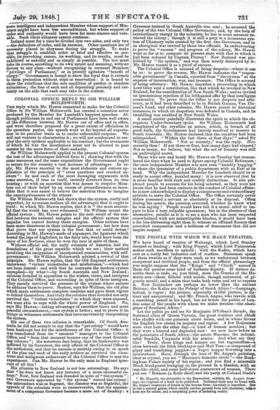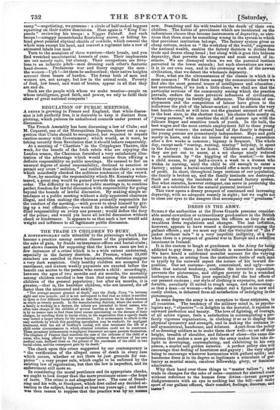THE PEOPLE WITH WHOM WE MAKE TREATIES.
WE have heard of treaties of Waitangi, which Lord Stanley deemed so binding ; with King Peppul, which Lord Palmerston makes such sacrifices to uphold ; with the Kafka, which have cost us a costly but ludicrous-sort of warfare. Statesmen speak of these treaties as if they were such as we understand between competent and civilized people, and from the official phraseology you might suppose that the "Kings" and " Chiefs ' named in them did possess some kind of barbaric dignity. If writers de- scribe them as rude, so, you think, were the Greeks of the Ho, merit sera—those fellows with minds, though untutored, of gi- gantic mould, and a mien that tasks both verse and art to express it. New Zealanders are perhaps no lower than the ancient Britons; the Kafirs are the Pelasgi of South Africa?—Language. indeed, is vague ; but picture, especially skilful picture, is dis- tinct and unequivocal; and Mr. French Angas, who travels with a searching pencil in his hand, has set before the public of Lou,, don some of the people with whom we make treaties—the aborid, gives of Southern Africa.* Let the public go and see Sir Benjamin D'Urban's friends, the fraternal allies of Queen Victoria, the great warriors and Aida who chaffer with our generals about terms, and in whose favour the English law abates its majesty and rigour. A few Bosjemans were over here the other day—a kind of human monkies ; but they were a hunted and degraded race : we now have before in the potentates of South Africa—the astute Macoma, the indomi. table Sandilla, Umpanda with his armies. And what are they like? Truly, these kings and kaisars are but ragamuffine,a cross between the Irish bricklayer and Mad Tom—a compound of gipsy and, wandering juggler—a Negro beggar flowering into a mountebank. Here, through the lens of Mr. Angas's pain • clear as crystal, you see " Macoma's domestic circle "—the B ingham Palace society of his region; and you find a miserable Black blackguard lounging on the ground in. a blanket, with- an imp-like child, and some half-dozen scarecrows of women. There you see " liotman (a Kafir chief) and his party at Colonel Slade's * Mr. Hogarth, the printseller in the Haymarket, exhibits Mr. Angas's draw- ings, the originals of a work to be published. Technical fault may be found with Mr. Angas's treatment of details in the human form: his study is imperfect. But he has a natural genius which readily catches general form and character, widta keen eye for colour, and a surprising power of imitating reality. camp "—negotiating, we presume : a circle of half-naked beggars squatting on their native dominions. Here again is "King Um- panda" reviewing his troops : a Nigger Falstaff. And such troops !—scraggy mountebanks flourishing staves, or hiding be- hind great pointed eliptical shields of cowhide, which conceal the whole man except his head, and convert a regiment into a row of animated labels run mad.
Turn to the mansions of these warriors—their kraals, and you find wretched unsubstantial kennels of cane. Their implements are not merely rude, but clumsy. Their occupations are frivo- lous to an infantile pitch—men dressing each other's fantastic head-dresses. Predaceous war and finery engage the men the women—Ugh !—let them be undescribed ; their native knights account them beasts of burden. The forms both of men and women are, not savage, but low in the animal scale. Poverty of food, low breed, and want of brains, appear in all that they are and do.
Such are the people with whom we make treaties—people on whose intelligence, good faith, and power, we rely to fulfil their share of great national compacts



























 Previous page
Previous page